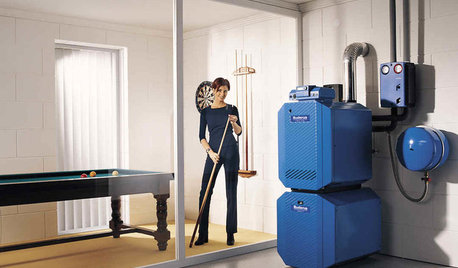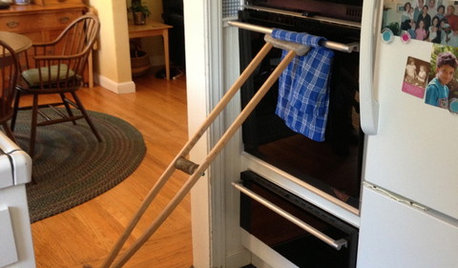Whole house Reverse Osmosis system
Hello everyone, this is my first post. I (the contractor of my choice!) will be building our new house starting in early 2008. We are now designing, selecting systems, materials, etc. One of those systems will be a whole house reverse osmosis (WHRO) water filtration system. The system will be placed at the source so all water in the house will be treated. In reseaching this, I have received conflicting information (hard to believe!!). An engineer with a RO manufacturer stated that I should plumb the entire house with something other than copper (PEX)as the purified water will act as an agressive solvent and will pull copper out of the pipes which would not be good. Another said if I adjust the PH balance using another filter in the RO system the purified water will be PH balanced and will not act as such an aggressive solvent and copper plumbing should be fine.
I am leaning towards plunbing the entire house with PEX but what about the copper in the fixtures and the metallic connections? Anyone here an expert on RO systems as they relate to copper, PEX, copper fixtures, copper or metallic connectors?
Comments (21)
maxtimeoff
Original Author17 years agoWe are on a municipal water system so an RO system is not an absolute necessity. RO is considered to be the best and is state of the art when it comes to water purification. We would like to have pure water for all aspects of living; drinking, showers, plants, car washing, the list goes on and on. The concept of having several POU systems seems inefficient and somewhat like a patchwork solution. If one is starting from scratch like building a new home, it seems that a comprehensive solution such as a small commercial, or an advanced residential RO unit might be the "right" way to provide for all of our wants/needs. I am willing to spend upwards of $10K to $15K for this system. While it is expensive, as a percentage of the total construction it is an area where I am willing to spend. Money is not the driving force in this case.
At this point, I need more information. You point about the copper feed tube in the refer is exactly what I am concerned about. According to RO manufacturers WHRO units are in use, and are gaining in popularity. What are people doing about all of the copper/metallic appliances, valves, stub-outs, etc.? Even if one were to plumb the entire house in PEX isn't there still going to be copper stuff throughout the house?
Seems like the answer might be to somehow lessen the aggressiveness of the RO pure water, but, wouldn't that be adding stuff to the water that you just filtered out?
Hopefully this will give you more insight as to why I am contemplating this WHRO system. Any insight will be greatly appreciated.
Related Professionals
Boise Plumbers · North Druid Hills Kitchen & Bathroom Remodelers · Citrus Park Kitchen & Bathroom Remodelers · Athens Kitchen & Bathroom Remodelers · Green Bay Kitchen & Bathroom Remodelers · Idaho Falls Kitchen & Bathroom Remodelers · Kettering Kitchen & Bathroom Remodelers · Omaha Kitchen & Bathroom Remodelers · Phoenix Kitchen & Bathroom Remodelers · Rancho Cordova Kitchen & Bathroom Remodelers · Superior Kitchen & Bathroom Remodelers · Vashon Kitchen & Bathroom Remodelers · West Palm Beach Kitchen & Bathroom Remodelers · Shaker Heights Kitchen & Bathroom Remodelers · Travilah Kitchen & Bath FixturesUser
17 years agoThe following is simply MY opinion ...
In theory your idea is sound, BUT the reality is that we need some stuff in the water to maintain proper health.
PEX may not be the answer. I've been reading more and more about mice and rats eating PEX. I think (don't quote me) that PEX is no longer approved in new construction in San Diego for that reason.
My solution for you ...
The appropriate water softener serving the entire house. Soft water for the water heater, washing machine, hose bibs outside (for washing the car), toilets, tubs, etc. A point of use RO under the kitchen sink for drinking, cooking, and icemaker water.
I've lived exactly that way for over 10 years without a single problem. My water is 26-30g hard and my icemaker is over 10 years old and so is my water heater. Normal life around here is 1 year for an icemaker and 1.5-2.5 years for a water heater.
Your willingness to spend money on top notch water treatment is commendable but I think you're going in the wrong direction.
IF you absolutely have to have a whole house RO I would plumb the house to keep that RO water away from appliances ... so then what's the point.
First thing, I'd like to see a complete water test and then we can type intelligently about your idea.
As always, free advice is worth what you pay for it.
rjoh878646
17 years agoWith a whole houe RO system you will have one HUGE water bill. A RO system typically wastes 20-30% passing through it. You will need something other than copper piping or brass faucets because it will eat the faucets out. You will also need a booster pump system made of stainless steel to boost the water back up to house pressure. Also need a giant plastic lined storage tank to hold all the RO water.
A special hot water heater that will not corode with the RO water going through it etc.....I worked at a semiconductor facility where they made DI (deionized) high purity water for the wafer processing. The first step was passing it through a RO system. The membranes were very expensive to replace.
The DI water was so pure, if it taken internally,would pull the minerals out of your system. It is very agressive. It is so pure it will not conduct electricity.
What I am saying a whole house RO system is overkill. All I ever did was put a filter system in that removes the lead, chlorine and other contaminants at a point of use faucet in the kitchen which is used for drinking water. If you don't like showering with chlorine water, they make filters for shower heads.
Just get a point of use RO system that can be piped to kitchen sink and the bathroom sinks. Point of use faucets that can be used installed for teeth brushing and drinking water. Using it for washing hands and showering is overkill.
andy_c
17 years agoUsing a WHRO system is rarely ever advised unless you have TDS (primarily sodium) of over 3000.
Another factor to consider is the retention system. Utility RO systems are normally geared for 'twice' their expectant use. So figure 150 gallons per person per day. For two people you would need a holding tank of 300 gal followed by a repressurization pump and pressure tank. Sure if money is no object....
The additional equipment probably mentioned to cause pH to counteract the effects on plumbing is simply as calcite feed which will raise pH and hardness causing a tendancy for scalling on the pipes rather than corrosion. This sort of defeats one of the purposes of the RO in the first place.
A happy medium may be a nano-filteration. This membrane isn't as refined as a RO membrane and will let small amounts of TDS through making the water less aggressive. It will also produce more water on a daily basis and the membranes will last longer. It will soften your water by removing calcium and other hardness elements.
Dechlorination prior to membranes is still advised, regardless of which TFC membrane is used.
All-in-all, though, the aforementioned advice on a proper (read: typical approach) system may prove more effective and cost saving. An efficient POE system followed by a high quality RO for drinking qwater is more than adequate for residential--even for particular owners--purposes.
Andy
annet_sorisho
16 years agoHave you heard of lifesource water system? http://www.lifesourcewater.com
I am in the same shoe and I want the whole house filtered. These are the only people I found that they are using carbon fileteration. I currently have water softner along with RO but as some one else was saying it does waste alot of water and I am not that keen about that. any findings or feedback is appreciated.User
16 years agoThis has been covered previously, but here's a quick synopsis: lifesource is just a carbon filter, and a much more expensive carbon filter than you can purchase elsewhere. It will remove taste and odor, but you will still have hard water and all problems associated with it. Your existing RO system does not waste a huge amount of water, likely only a gallon or two daily. The system you have now is much better than the lifesource system.
bemis
16 years agoStoring high purity water in large quantities is a recipe for bioburden growth (bacteria) that you don't even want to think about. Operating companies have a hard enough time keeping an high purity water system running. I can't imagine the typical homeowner would have a clue about maintaining a sanitarystate of a water system. Once you remove the chloramines from the water, it's open season for bug growth. I hope this system comes with a great service contract...you'll need it.
rayfromalaska
16 years agoA problem I can see with a whole house RO system is the excessive amount of water that is going to be wasted. Maybe one under the kitchen sink, as mentioned above by another poster, may be a better idea.
I just have a 3-filter water purification kit under the sink, and for the whole house I use a water softener.
conate
16 years agoI have gone down this route myself. Not RO for whole house, just considering whole house.
I use whole RV water filtration. I bought this incredible filter system from a company in canada. Their website is at doulton.ca and it uses a system of ceramic cartridge with a carbon core.
Takes out everything nasty but leaves good stuff.
Personally on municipal water systems, I plan to use a point of use filter in the kitchen, antichlorine filter in teh shower, but for the most part, NOT filter the water for the toilet etc.
I have no financial interest in doulton.ca just a satisfied customer.
Nate
busboy
16 years agoAquasanna is a low cost highly effective filtration system for point of use as well as showers, and whole house filters. I had an RO system, and my water bills were higher. When the membrane wore out I replaced it with less expensive Aquasanna system. This system does NOT remove all the minerals that should be present in natural drinking sources. Filter replacement is every 6 months but the program can set you up for automatic replacements.
Here is a link that might be useful: aquasana
User
16 years agoPerhaps it's just me, but I don't care to purchase any filtration system that won't tell me what their filter media is. Filter A is sediment and chlorine s processes that are more efficient if separated. Filter B claims to replace lead with potassium, difficult to do if you're not removing hardness as well. The system seems suspect - their claims don't match their technology, but they are very vague about their technology to it's hard to tell.
karolmiller_yahoo_com
15 years agoI too am needing to purchase a whole house reverse osmosis system. I appreciate all your comments thus far and definately need guidance. I am allergic to Nitrates, Nitrites and Sodium and need to remove them from my drinking and bathing/showering water. All three of these substances are in my municipally treated water although below the legal limits that require treatment. It is my understanding that the only home system that will remove these substances is a WHRO, is that true? Any experts out there?
kateskouros
15 years agoi must disagree. there are no minerals in drinking water that are necessary for good health. the "minerals" are inorganic, besides being contaminated. i don't let my kids drink chlorine either. i'll sooner give them a coke. reverse osmosis or distilled is the most healthful water.
andy_c
15 years agoI am not a medical professional or a nutiritianist. I have never heard of an allergic reaction to nitrates/nitrites, or sodium. Is there a name for this malady? What are the symptoms? If you shower in sodium-laced water, what is the reaction? I have heard of 'blue baby' from infants being affected by nitrates/nitrites, but never to any extent with adults. Interesting!
A WHRO is possible if you have the money, motivation, money, plumbing, space, and, of course the money. In the vast majority of cases, it is not a prudent thing to do. ROs can reduce n/n but at a level far less efficient than many other elements that membrane technology can remove.
I agree with kateskouros. Never depend on your drinking water for nutrition. That should left to your diet and suppliments. Water should be used as a transporter of nutrients, not a supplier. There are mineral filters that can add (dissolve) nutrients (calcium and magnesium) to RO water for those in the 'need'.
Of course, you could take a handful of gravel from the driveway (keep to the side away from your car's dripping oil pan) put it in a blender with some carbonic acid and blend and filter it to get your daily calcium, and, of course, all those other 'natural' elements.
And if someone's (busboy's) water bill shot up because of the use of an RO, then he has bigger waste water problems that he thinks, he bought one crappy piece of equipment or his statement is marketing motivated (noted the link). Every drop of water that you use on a daily basis, goes to waste. RO drain can arguably be the most valuable and functioning waste you have.
Andy Christensen, CWS-II
karolmiller
15 years agoThe allergic symptoms I'm affected by are similar to what a person with Gluten Intolerance suffers. To make a very long story short - it has the effect of destroying the cilia that line your small intestine. The cilia's job is absorbing nutrients into your body. Once exposure to the allergen stops - the cilia will grow back and start to do their job once again. In the meantime it destroys your health. It is necessary to remove the allergens from bathing/showering water because your skin absorbs substances present in the water during bathing and you also inhale them from the water vapers - some estimates are as high as the equivalent of 3 to 5 glasses of water during a 10 minute shower. I am certainly open to options that don't require WHRO - I just need to know that it will remove the Nitrates, Nitrites and Sodium. What other processes (besides distillation) will accomplish that and will it destroy my plumbing?
kateskouros
15 years agovery true, karolmiller... our skin is an organ. warm water opens pores and toxins are absorbed into the skin and fed directly to our bloodstream. some are obviously more sensitive than others. here's a link to a very lengthy article which ultimately recommends some sort of magnetic conditioning treatment. link: (www.clearwatermax.com)
here's the link to the article:
http://www.thenaturalguide.com/pure-water.htmkateskouros
15 years agothe filter recommended in the article is: custompure.com
my head is spinning. i never thought i'd spend so much time trying to figure out the water situation for our new home!
ilmbg
15 years agokarolmiller- Why in the world would you be concerned by water absorption of a nitrate to nitrite? There is usually not nitrites in water unless you are in a runoff area of fertilizers,cattle or other close contamination.
Have you had your water tested- there might be no nitrites at all.
There are nitrate allergies, but they are the nitrite drugs- usually amyl. Amyl is a good drug that opens arteries ie during a heart attack, but some people are allergic. There are other industrial nitrites that are bad.
Our bodies produce more nitrite per day, than is in a hotdog- we produce about 62mg/day.
Nitrites are needed to help clot blood, heal wounds, heal burns, and to kill tumor cells.
Nitrites are used to kill botulism.
Green leafy vegetables supply 100-170 mg/day of nitrate.
Converted to nitrite, the absorbtion is less than .1/mg/day.
The digestive system, particulary the small intestine is where absorption would occur- and not by 'cilia'. Cilia is a small hairlike organelles that create movement.
Villi are what absorbs nutrients in the small intestine.
The breakdown of hemaglobin to methemoglobin happens everyday. Less than 1% of the hemoglobin is turned to methhemoglobin.
If there were any nitrite in bathing water, any absorption is excreted by the kidneys, not the digestive tract.
Scientific study shows that there is more nitrites in a healing process of a wound than in processed meat.biermech
15 years agoKarolmiller. If you are goming to install a WHRO the first step is to get a water test. Hardness, iron and h2s are factors. High iron or hardness will reduce the life of the membrane. The h2s will pass through the membrane. Depending on the amount of these elements, pretreatment is a must for long membrane life.
Ph is a factor as well. RO's will reduce the Ph typically by 1 which is to the extreme. Low Ph will cause damage to copper plumbing. To control the Ph, place a Ph neutralizer after the ro.
If you have further questions, feel fre to e-mail me.
affordablewtr@aol.comAshley R
3 years agoI’m not a pro by training but I spent a solid 4 months (every single day) researching, reading, talking to chemical engineers at the local university, plumbers, etc. I exhausted myself day and night. I slept with my phone waiting for replies from a water chemist engineer from Germany. Stress. Bought a house with a well. Had water tested at lab and I had just about every problem imagined. Forget the local water treatment salesmen, unless you just want to make a donation. Waste of time and inefficient. I wasted a lot of time with those companies before I realized they didn’t know a damn thing. First test water for EVERYTHING! Yes, you have to go to a lab and probably spend $250.00 or more. Hardness PH bacteria levels iron sulfur and Sulphates TDS, alkalinity, manganese, everything! Get results and go from there. I had high iron, hardness, iron bacteria, dangerously high sulphates, rotten egg smell, all with a low
Flow rate well. This matters! After handling all of my issues I was stuck with sulphates which is hard to deal with. R/O is the only way. This means I was going to be limited to having drinkable water in one location in my brand new house...the kitchen sink. I couldn’t even use the water dispenser or ice machine from my fridge because there was no practical way to connect an r/o system. I wanted a full house r/o where my kids could get water from their bathroom sink...but I have copper pipes so I didn’t think it was an option. ****IT IS AN OPTION no don’t have to re-pipe. BUT YOU DO HAVE TO TREAT OTHER ISSUES FIRST. Hard water doesn’t do well going into R/O system.Simply put, you r/o for the entire house and after R/O system you install another system which is a re-mineralizing the water to neutralize the PH and make it taste REALLY GOOD! The neutralized water (ph around 7-8) will not corrode anything. Water tastes just like the ph water from “smart water”
You will spend some money. There will be an adjustment period while you fine tune everything. It’s worth it at the end. Licensed plumber for install. Water salesmen can not do this.
Good luck. Bad water sucks, I almost put our house back on the market because nobody could figure it out. Eventually, some very kind and intelligent people helped me. They weren’t selling anything or getting anything in return. They just simply took the time to help someone in a bad situation. I am grateful and found this post and wanted to share. There is a way to fix water, no matter how bad.


















User